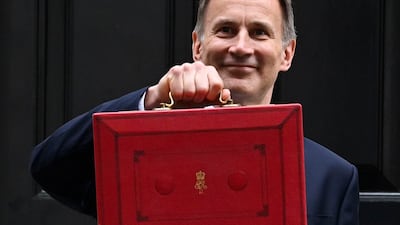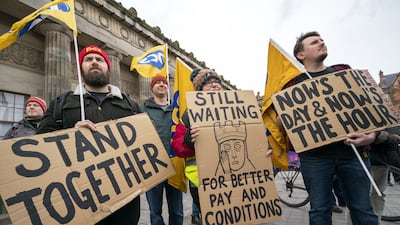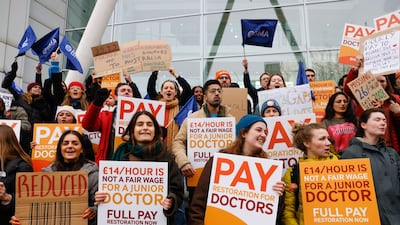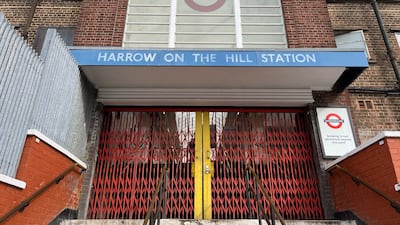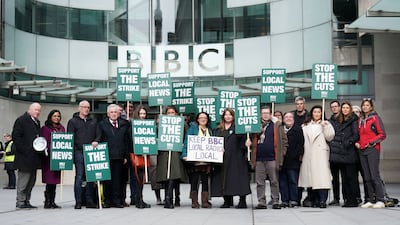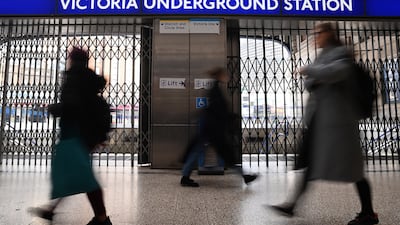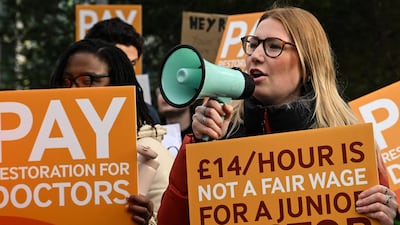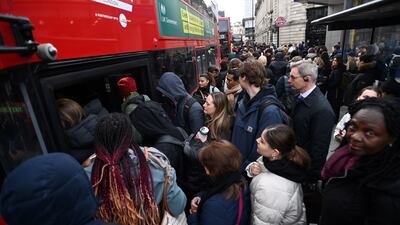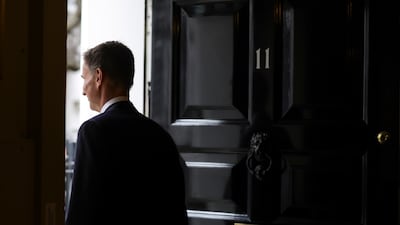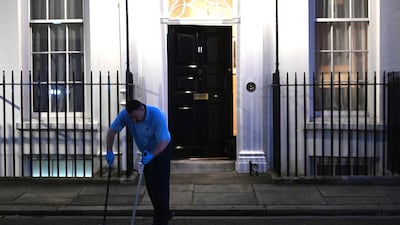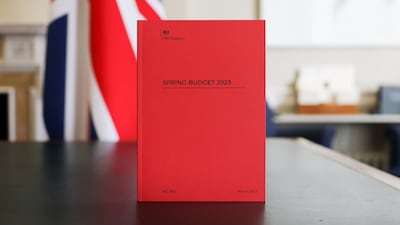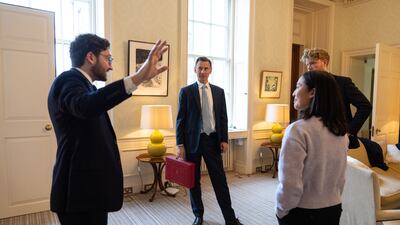Chancellor Jeremy Hunt has pledged in the annual budget speech to deliver “long-term, sustainable, healthy growth" by removing obstacles to business investment and ease a labour shortage.
With high inflation, weak growth, the cost-of-living crisis, strikes and a tight labour market, Mr Hunt had a tricky balancing act. He said on Wednesday the economy would contract 0.2 per cent this year, but avoid a technical recession of two consecutive quarters of downturn.
Mr Hunt added there would be “healthy growth of 1.8 per cent next year, 2.5 per cent in 2025 and 2.1 per cent in 2026".
His budget speech came on another day of mass strikes in the UK, with more than 100,000 teachers, junior doctors and London Tube drivers walking out.
Because the economy recently delivered more tax revenue than expected, public sector borrowing is £30 billion ($36.22 billion) below forecast, which gave Mr Hunt some headroom when formulating his spending plans.
Huge drop in inflation forecast
Mr Hunt said the UK economy was “on the right track” and that Office for Budget Responsibility forecasts now predict inflation will fall from 10.7 per cent last year to 2.9 per cent by the end of 2023.
In November, the OBR predicted inflation would be 7.4 per cent by the end of this year.
“Today the Office for Budget Responsibility forecast that because of changing international factors and the measures I take, the UK will not now enter a technical recession this year,” Mr Hunt said.
“They forecast we will meet the Prime Minister's priorities to halve inflation, reduce debt and get the economy growing.”
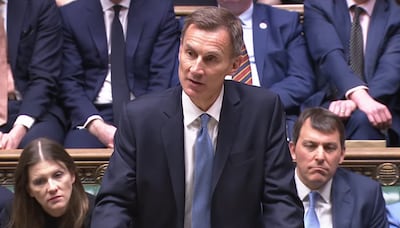
Help with household energy bills
One part of the budget that was confirmed before Mr Hunt even got to Parliament was the extension to the energy price guarantee, which caps average annual household bills at £2,500. It will continue at that level until the end of June.
It had been due to rise to £3,000 next month and the cost of scrapping the planned 20 per cent increase will be about £3 billion.
The move will save the average UK household about £160. From July, average energy bills are expected to have fallen below the government cap, meaning the support will no longer be needed.
“High energy bills are one of the biggest worries for families, which is why we're maintaining the energy price guarantee at its current level,” Mr Hunt said.
“With energy bills set to fall from July onwards, this temporary change will bridge the gap and ease the pressure on families, while also helping to lower inflation, too.”
Corporate tax rise tempered
As expected, Mr Hunt announced that corporation tax for companies with annual profits of more than £250,000 would rise from 19 per cent to 25 per cent.
“We already have lower levels of business taxation than France, Germany, Italy or Japan,” Mr Hunt said.
“But I want us to have the most pro-business, pro-enterprise tax regime anywhere. Even after the corporation tax rise this April, we will have the lowest headline rate in the G7 — lower than at any period under the last Labour government.”
He added: “Only 10 per cent of companies will pay the full 25 per cent rate. But even at 19 per cent, our corporation tax regime did not incentivise investment as effectively as countries with higher headline rates.
“For smaller businesses, we have increased the Annual Investment Allowance to £1 million, meaning 99 per cent of all businesses can deduct the full value of all their investment from that year's taxable profits.”
When it came to the replacing the super-deduction programme, which allows companies to gain tax relief of 130 per cent of capital expenditure, Mr Hunt also announced a policy of “full expensing” for the next three years, with an intention to make it permanent.
“That means that every single pound a company invests in IT equipment, plant or machinery can be deducted in full and immediately from taxable profits. It is a corporation tax cut worth an average of £9 billion a year for every year it is in place,” he explained.
“And its impact on our economy will be huge. The OBR says it will increase business investment by 3 per cent for every year it is in place.
“This decision makes us the only major European country with full expensing and gives us the joint most generous capital allowance regime of any advanced economy.”
He also unveiled new financial incentives to boost smaller research-intensive companies, in a move designed to help small and medium-sized enterprises in the life sciences sector develop new treatments.
“It is a £1.8 billion package of support helping 20,000 cutting-edge companies who are turning Britain into a science superpower,” he said.
For qualifying companies that spend 40 per cent or more of their total expenditure on research and development, they will be able to claim a credit worth £27 for every £100 they spend, Mr Hunt said.
Childcare expanded
As a major pillar of a budget that aimed to get more people back into work, Mr Hunt announced the expansion of free childcare for one and two-year-old children.
The move will provide an extra 30 hours per week of childcare to parents of children above the age of nine months, and increase funding by £288 million by 2024-25 for nurseries under the existing programme of free childcare for three-year-old children.
With a full-time nursery place estimated to cost an average of nearly £15,000 pounds a year for a child under two in England, childcare in the country is among the most expensive in the world and takes up an average of almost 30 per cent of the income of a couple with two young children.
Surprise on pension caps
In a surprise move, Mr Hunt said he would abolish the lifetime tax allowance that applies to the amount of money people can save into their pensions without incurring extra charges.
As such, the LTA, which had meant that people faced a 25 per cent levy if they saved more than £1.1 million ($1.33 million) in their pension pots, will fall away.
Also, the amount of money that people can put into their pensions in one year without paying tax will also rise, to £60,000 from £40,000, he said.
The moves are designed to stop people, particularly doctors and other professionals, from quitting the workforce or reducing the hours they work when their pensions surpass the tax thresholds.
“It’s a pension tax reform that will stop over 80 per cent of NHS doctors from receiving a tax charge, incentivise our most experienced and productive workers to stay in work for longer and simplify our tax system, taking thousands of people out of the complexity of pension tax,” Mr Hunt said.
“I do not want any doctor to retire early because of the way pension taxes work.”
Mr Hunt also announced an £11 billion increase in the UK's defence budget to be spread over five years, which would take defence spending as a proportion of gross domestic product from 2 per cent to 2.25 per cent.
He said that 12 new investment zones will be created, with each having “access to £80 million of support for a range of interventions including skills, infrastructure, tax reliefs and business rates retention”.
The Chancellor also outlined tougher sanctions for benefits claimants who fail to meet the requirements to be deemed looking for work or those that choose not to take up a reasonable job offer.
